Black History
Sen. Kamala Harris Officially Enters the 2020 Presidential Race with Bold Morality
NNPA NEWSWIRE — A graduate of Howard University and a member of the AKA sorority, Harris’ rollout has been the most methodically of anyone who has entered the 2020 sweepstakes. Right down to the typography and campaign slogans, which are in the style of the historic 1970s campaign of the first Black woman ever elected to Congress, Shirley Chisholm, Sen. Harris’ rollout has reached for clarity.
By Lauren Victoria Burke, NNPA Newswire Contributor
“We are here at this moment in time because we must answer a fundamental question. Who are we? Who are we as Americans? So, let’s answer that question, America. We are better than this,” Sen. Kamala Harris (D-CA) said in front of a large crowd in Oakland, California on the afternoon of January 27.
In a much-anticipated announcement, the Senator from California and former Attorney General officially announced she was a candidate for the presidency in 2020. Seven days before, on ABC’s Good Morning America, she made it clear she was in the race. In what many say was one of her best speeches to date in front of a presidential-size crowd she made it official.
A graduate of Howard University and a member of the AKA sorority, Harris’ rollout has been the most methodically of anyone who has entered the 2020 sweepstakes. Right down to the typography and campaign slogans, which are in the style of the historic 1970s campaign of the first Black woman ever elected to Congress, Shirley Chisholm, Sen. Harris’ rollout has reached for clarity.
In the age of Donald Trump’s politics that clarity and focus on morals was made clear by the 54-year old attorney and U.S. Senator. Harris used the word “we” a lot during her speech. It was a clear indication of the type of campaign she plans to run.
“Of the people, by the people, and for all people,” Harris said, “People are trying to convince us that the villain in our American story is each other. But that is not our story. That is not who we are.”
While Sens. Elizabeth Warren (D-MA) and Kirsten Gillibrand (D-NY) have announced exploratory committees that will likely lead to an official presidential run. Sen. Harris is now in the 2020 race all the way. In the first 24 hours after confirming she would run seven days ago on television her campaign raised $1.5 million.
Harris joins the biggest and most diverse field of candidates in the history of American politics.
“One of the huge tests for Kamala Harris was whether she could translate all that’s compelling about her on paper, go onto a stage and deliver a retail political speech that’s compelling and resonant. Hard to argue she didn’t do that today,” wrote MSNBC host Joy Reid on January 28 on twitter.
On the same day, former Starbucks CEO Howard Schultz talked on 60 Minutes about a presidential run. There were also reports that former Secretary of State Hillary Clinton has not ruled out a run in 2020.
But Harris’ name recognition and charisma will likely giver her an advantage as the first candidate outside of the baby boomer generation whose candidacy is a reminder of the historic and successful 2008 run of former President Barack Obama.
Lauren Victoria Burke is an independent journalist and writer for NNPA as well as a political analyst and strategist as Principal of Win Digital Media LLC. She may be contacted at LBurke007@gmail.com and on twitter at @LVBurke
Activism
Oakland Post: Week of October 30 – November 5, 2024
The printed Weekly Edition of the Oakland Post: Week of October 30 – November 5, 2024

To enlarge your view of this issue, use the slider, magnifying glass icon or full page icon in the lower right corner of the browser window. ![]()
Activism
“Two things can be true at once.” An Afro-Latina Voter Weighs in on Identity and Politics
“As a Puerto Rican I do not feel spoken to in discussions about Latino voters… which is ironic because we are one of the few Latino communities who are also simultaneously American,” Ortiz-Cedeño says. Puerto Ricans born in Puerto Rico, a U.S. territory, have American citizenship by birth but they do not have the right to vote for president if they live on the island. “I think that we miss out on a really interesting opportunity to have a nuanced conversation by ignoring this huge Latino population that is indigenously American.”
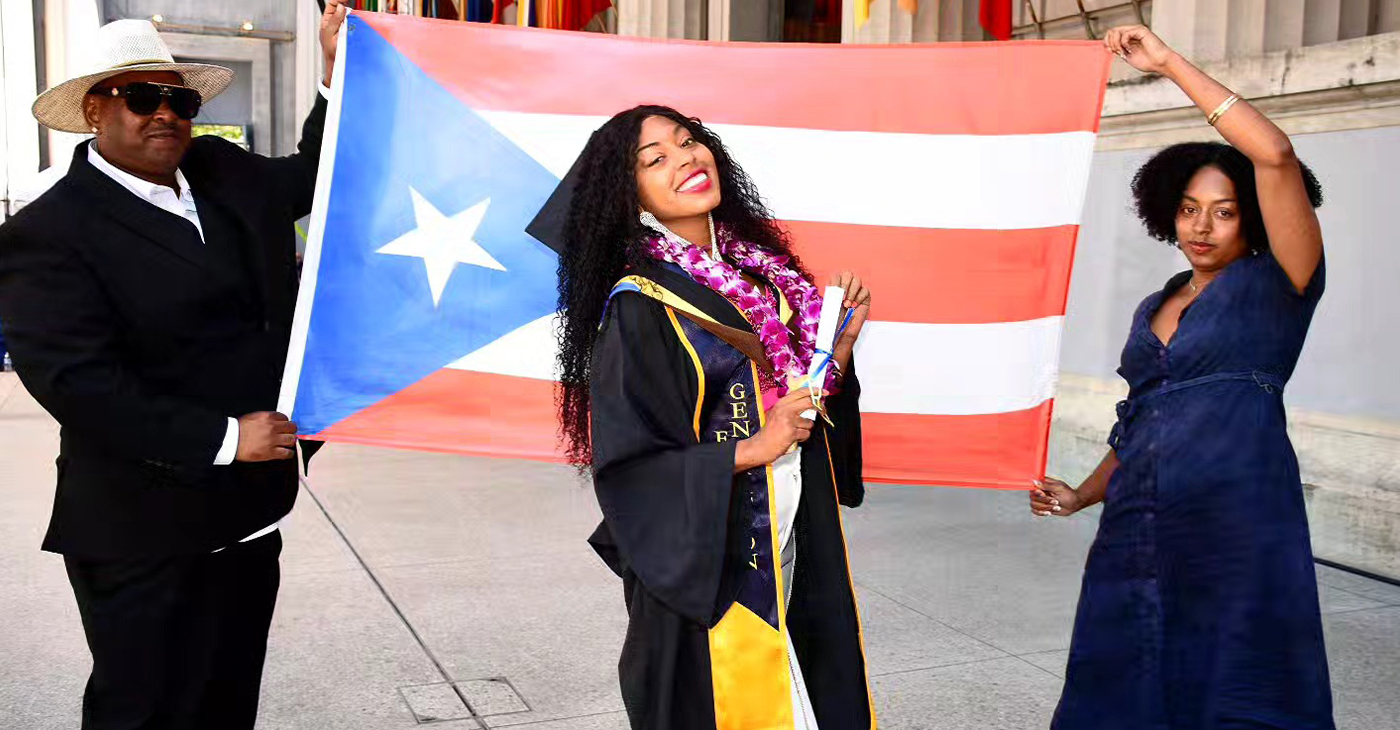
By Magaly Muñoz
On a sunny afternoon at Los Cilantros Restaurant in Berkeley, California, Keyanna Ortiz-Cedeño, a 27-year-old Afro-Latina with tight curly hair and deep brown skin, stares down at her carne asada tacos, “I’ve definitely eaten more tortillas than plantains over the course of my life,” says Cedeño, who spent her childhood in South Texas, among predominantly Mexican-American Latinos. As she eats, she reflects on the views that American politicians have of Latino voters.
“As a Puerto Rican I do not feel spoken to in discussions about Latino voters… which is ironic because we are one of the few Latino communities who are also simultaneously American,” Ortiz-Cedeño says. Puerto Ricans born in Puerto Rico, a U.S. territory, have American citizenship by birth but they do not have the right to vote for president if they live on the island. “I think that we miss out on a really interesting opportunity to have a nuanced conversation by ignoring this huge Latino population that is indigenously American.”
Ortiz-Cedeño, an urban planner who is focused on disaster resilience, homelessness and economic prosperity for people of color, says that political conversations around Latinos tend to shift towards immigration, “I think this ties back into the ways that our perception of ‘Latino’ tends to be Mexican and Central American because so much of our conversation about Latinos is deeply rooted in what’s happening on the border,” she says. “I don’t think that the Afro-Latino vote is frequently considered when we’re talking about the Latino vote in the United States.”
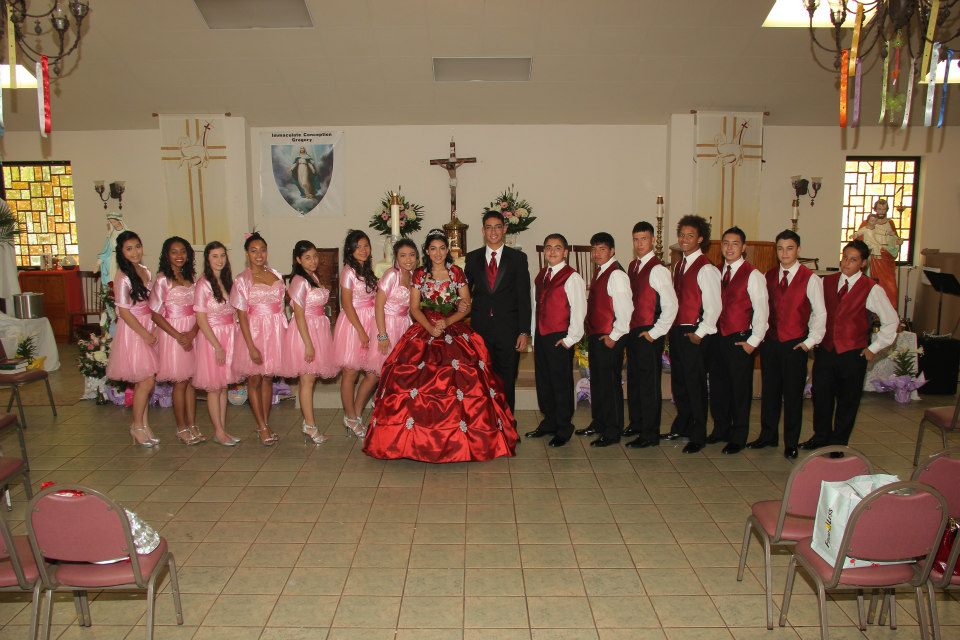
Primarily surrounded by Mexican-Americans while growing up in South Texas, Keyanna participated in many Chicano cultured events, such as being a dama in several quinceñeras. Courtesy photo.
As Ortiz-Cedeño sifts through childhood photos of her as a happy teen dancing with the Mexican ballet folklorico group in high school and as a dama in quinceñeras, she reflects on growing up in South Texas, an area with a large population of white and Mexican-Americans. The Black population was small, and within it, the Afro-Latino population was practically nonexistent.
“It was interesting to try to have conversations with other Latinos in the community because I think that there was a combination of both willful ignorance and a sort of ill intent and effort to try and deny my experience as a Latino,” she says. “There are a lot of folks in Latin America who experience a lot of cognitive dissonance when they think about the existence of Black Latinos in Latin America.
Ortiz-Cedeño comments on the long history of anti-Blackness in Latin America. “Throughout Latin America, we have a really insidious history with erasing Blackness and I think that that has been carried into the Latino American culture and experience,” she says. “People will tell you, race doesn’t exist in Latin America, like we’re all Dominicans, we’re all Puerto Ricans, we’re all Cubans, we’re all Mexicans. If you were to go to the spaces with where people are from and look at who is experiencing the most acute violence, the most acute poverty, the most acute political oppression and marginalization, those people are usually darker. And that’s not by accident, it’s by design.”
Because of the lack of diversity in her Gulf Coast town, as a teenager, despite being the only Spanish-speaker at her job in Walmart, Latinos refused to ask for her help in Spanish.
“Even if monolingual [Spanish-speaking] people would have to speak with me, then they were trying to speak English, even though they could not speak English, versus engaging with me as a Latina,” she says.
“I think that the perception of Latinos in the United States is of a light brown person with long, wavy or straight hair. The perfect amount of curves and the perfect combination of Indigenous and white genes. And very rarely will people also consider that maybe they also have a sprinkle of Blackness in them as well,” she says. “Over 90% of the slave trade went to the Caribbean and Latin America.”
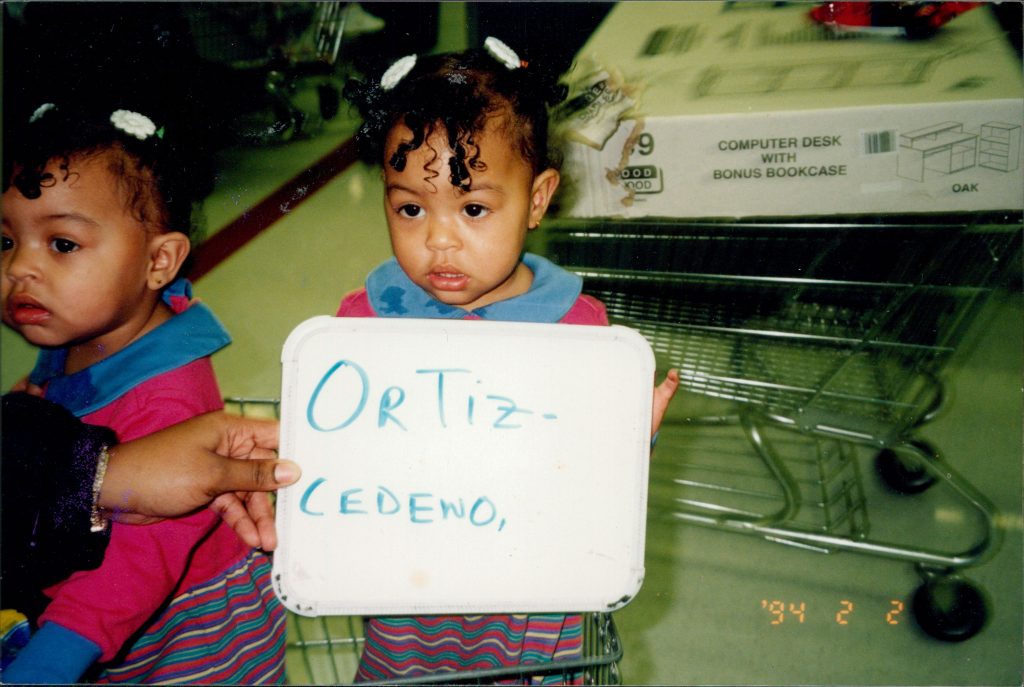
Keyanna as a toddler, holding a whiteboard up with her last name, Ortiz-Cedeño, on it. Courtesy photo.
Ortiz-Cedeño remembers when a Cuban family moved in next door to her in Texas. The teen daughter had blue-eyes, blonde hair and only spoke Spanish, which caused neighboring Latinos to take pause because she didn’t fit the Latino “look” they were used to.
“People didn’t have an option to try and negate her [Latino] identity because they had to acknowledge her for everything that she was,” Ortiz-Cedeño says.
Later on, the girl’s cousins, a Black, Spanish-speaking Cuban family, came into town and again locals were forced to reckon with the fact that not all Latinos fit a certain criteria.
“I think it forced everybody to have to confront a reality that they knew in the back of their mind but didn’t want to acknowledge at the forefront,” Ortiz-Cedeño says.
Having gone through these experiences as an Afro-Latina, Ortiz-Cedeño says it’s easy for her to understand Kamala Harris’ mixed Indian and Jamaican heritage, “It comes really naturally to accept that she is both Indian and Black. Two things can exist at the same time,” she says. “I had a long term partner for about seven years who was South Indian, from the same state as Kamala Harris, so if we had had a kid, they would look like [Harris],” Ortiz-Cedeño jokingly shares.
She says she can relate to having to walk the road of people only wanting to see Harris as a Black American. The talking point about [Harris] not being Indian or not being Black, just deciding to be Black, is really disingenuous and cheap,” she says.
Ortiz-Cedeño believes that the Harris campaign has not capitalized on the vice president’s mixed identity, which could be vital in bringing together different communities to understand each other on a new level and allow for improvements on America’s racial dynamics.

Keyanna co-managed a recovery center with her mother after Hurricane Harvey. They packed essentials, such as diapers, food, and water for families in need. Courtesy photo.
As she rushes into a Berkeley Urban Planning Commission meeting straight out of Ashby BART station, Ortiz-Cedeño explains her love for talking about all things infrastructure, homelessness, and healthcare access. The topics can be dry for many, she admits, but in the end, she gets to address long-standing systemic issues that often hinder opportunities for growth for people of color.
Having lived through the effects of Hurricane Katrina as a child, with the flooding and mass migration of Louisiana residents into Texas, Ortiz-Cedeño was radicalized into issues of displacement, emergency mitigation, and housing at nine years old.
“I remember my principal had to carry her students on her shoulders and swim us home because so many parents were trying to drive in and get their kids from school [due to] the flooding that was pushing their cars away,” she recalls.
Her family relocated to Houston soon after Katrina, only to be met with a deadly Hurricane Rita. They wound up in a mega-shelter, where Ortiz-Cedeño says she heard survivors stories of the unstable conditions in New Orleans and beyond, which got her wondering about urban planning, a term she wasn’t familiar with at the time.
“I think that when you put people in the context of the things that were happening in this country around [these hurricanes], a lot of us started to really think seriously about who gets to make decisions about the urban environment,” she adds.
Watching the heavy displacement of disaster survivors, hearing stories of her Navy veteran father’s chronic homelessness, and her own mother’s work and activism with homeless communities in the non–profit sector put her on the path to progressive politics and solutions, she says. After attending college on the East Coast- where she says she was finally recognized as a Puerto Rican- and working in housing, economic development, and public policy, she returned to California to earn a Master’s in City Regional Planning from UC Berkeley.
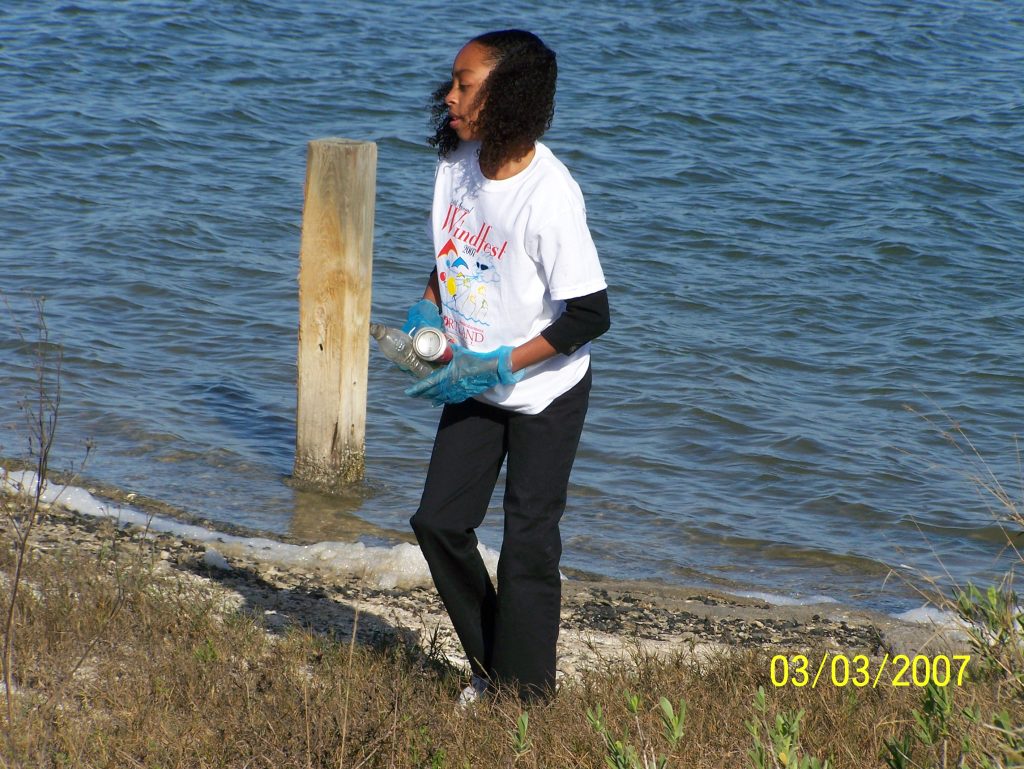
Young Keyanna volunteering at a beach clean up. Activism and giving back to her community has always been a key part of her upbringing. Courtesy photo.
Her vast interest in the urban success of underserved communities even took her abroad to Israel and Palestine when she was an undergraduate college student. “I’ve seen the border with Gaza, I’ve had homestays with farmers in the West Bank,” she says. “For me personally, Palestine is an issue that is really close to the heart.”
“I have a very intimate understanding of the conflict and I’m very disturbed by the way in which the [Democratic] party has not been willing to engage in what I would perceive to be a thoughtful enough conversation about the conflict,” Ortiz-Cedeño says. “The issue of Palestine is going to be one of those that is a make or break issue for her. It has not been one that has been taken seriously enough by the party.”
Ortiz-Cedeño is not under the illusion that one candidate will address every policy issue she wants to see tackled by the president. But she believes it’s better than what former President Donald Trump has to offer.
“Trump has made it very clear what his intentions are with Palestine, and what his relationship is with [Benjamin] Netanyahu,” Ortiz-Cedeño says. “I understand the political strategy that many people are trying to engage in by withholding their vote, but I would also encourage them to re-engage in the political process.”
Casting her vote for Harris is a decision grounded in calculation rather than outright support. “I think I can vote in this election in order to have harm reduction… because I have deep care and concern for other communities that are going to be impacted by a Trump presidency,” Ortiz-Cedeño says.
She also hopes that American politicians will consider the nuance and perspective that Afro-Latinos bring to the table when it comes to politics, policy, and race in America, “When we don’t think expansively about who is Latino in the United States, the breadth of Latino experiences in the United States, we miss an opportunity to capture how diverse Latinos interests are politically.”
This story was reported in collaboration with PBS VOCES: Latino Vote 2024.
Art
A Prolific Painter: Artist and Advocate Lois Mailou Jones
Lois Mailou Jones was a prominent African American artist whose career spanned more than seven decades, from the Harlem Renaissance to the modern art movement. She was not only a prolific painter but also an influential educator, bridging cultural gaps and challenging stereotypes through her vibrant and diverse works.

By Tamara Shiloh
Lois Mailou Jones was a prominent African American artist whose career spanned more than seven decades, from the Harlem Renaissance to the modern art movement. She was not only a prolific painter but also an influential educator, bridging cultural gaps and challenging stereotypes through her vibrant and diverse works.
Her unique journey of self-expression, dedication to art, and advocacy for African American and African themes made her a crucial figure in the evolution of American art.
Jones was born on Nov. 3, 1905, in Boston. Raised in an intellectual and supportive family, she demonstrated an early interest in art, encouraged by her mother, who believed in the importance of creativity. Lois studied at the School of the Museum of Fine Arts, Boston, where she faced racial challenges but persisted in pursuing her passion.
Her pursuit of higher education led her to the prestigious Design Art School, where she perfected her skills in textile design. Later, Jones attended Harvard University and received further training at the Académie Julian in Paris. This European experience greatly influenced her style and broadened her perspective on art.
Jones’s career began in textile design, creating works that were used by leading textile companies. However, her true passion was painting. During the Harlem Renaissance, she moved away from textile design to focus on fine art, exploring themes that reflected her heritage and the African diaspora.
Her early works were influenced by European Post-Impressionism, featuring landscapes and still life, but Jones’s style evolved over time. After spending time in Haiti, she was deeply inspired by Caribbean culture, and her palette became more vivid, her subject matter more symbolic. The influence of African and Caribbean culture is evident in her later works, where she used bright colors and geometric patterns to convey the spirit and stories of the people she encountered.
Her contributions to African American art were significant during a time when Black artists struggled for recognition. She often focused on themes of African heritage, pride, and unity, blending African illustrations and portraits with Western artistic techniques to create a unique visual language that celebrated Black culture.
She was also a dedicated educator. She began her teaching career at Palmer Memorial Institute in North Carolina and later became a professor at Howard University in Washington, D.C., where she taught for almost 50 years. Through her teaching, she influenced generations of young Black artists, encouraging them to explore and express their cultural heritage through art.
In the 1930s and 1940s, she worked to exhibit her work alongside other Black artists, helping to create a platform for voices that had long been excluded from mainstream galleries.
Recognition and Legacy
Jones achieved significant recognition throughout her lifetime, both in the United States and internationally. She exhibited her work across the globe, including in Paris, Africa, and the Caribbean.
Jones continued painting until her death in 1998, leaving behind a rich legacy of artistic achievements and contributions to art education. She broke boundaries by celebrating Black identity and heritage at a time when these themes were often marginalized.
-

 Alameda County5 days ago
Alameda County5 days agoAlameda County District Attorney Pamela Price Announces $7.5 Million Settlement Agreement with Walmart
-
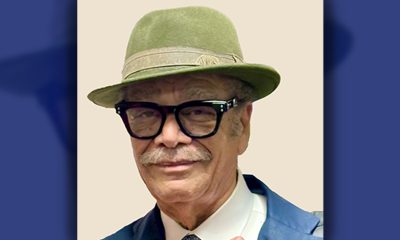
 Activism3 weeks ago
Activism3 weeks agoCOMMENTARY: DA Price Has Done Nothing Wrong; Oppose Her Recall
-
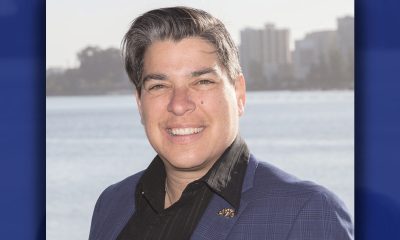
 Activism2 weeks ago
Activism2 weeks agoOP-ED: Hydrogen’s Promise a Path to Cleaner Air and Jobs for Oakland
-

 Activism3 weeks ago
Activism3 weeks agoBarbara Lee, Other Leaders, Urge Voters to Say ‘No’ to Recalls of D.A. Pamela Price, Mayor Sheng Thao
-

 Activism3 weeks ago
Activism3 weeks agoOakland Post: Week of October 9 – 15, 2024
-
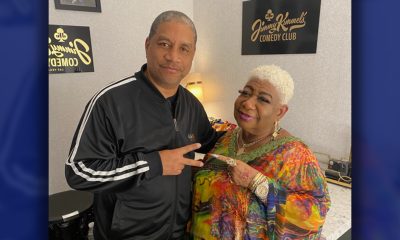
 Community2 weeks ago
Community2 weeks agoTerry T. Backs Oakland Comedy Residency by Oakland’s Luenell at Jimmy Kimmel’s Comedy Club in Las Vegas
-

 Business2 weeks ago
Business2 weeks agoStudy Confirms California’s $20/Hour Fast Food Wage Raises Pay Without Job Losses
-

 Activism3 weeks ago
Activism3 weeks agoSurge of Support for Vote ‘No’ on Recall of Mayor Sheng Thao





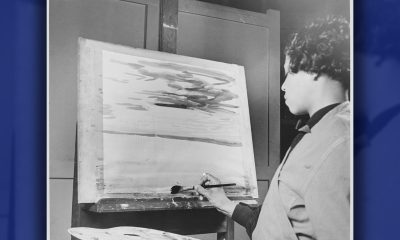


























































1 Comment